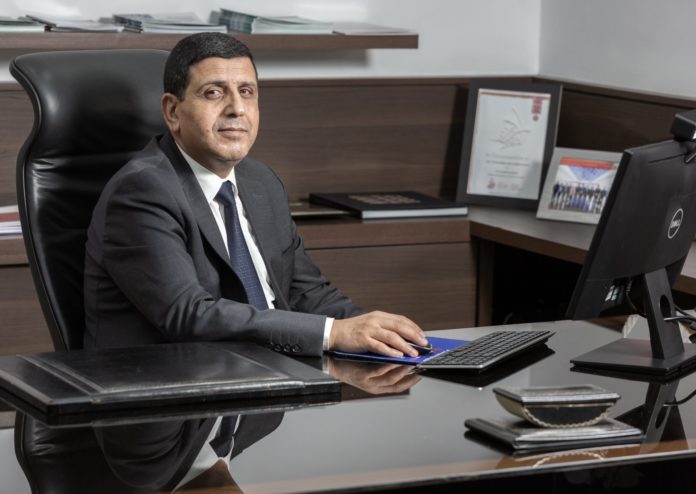This month, we spoke with Mr. Abdelbasset Ghanmi, General Manager, Invest in Tunisia Agency- FIPA: ’’FIPA’s well-planned and executed investor outreach campaigns is leading to concrete investment results and contribute to Tunisia’s development objectives.’’
- Invest in Tunisia Agency «FIPA-Tunisia» was established back in 1995. Could you please tell us about the Agency’s evolution and its current focus of work?Invest in Tunisia Agency- FIPA is a government entity created in 1995 with a focus in two interrelated areas of activity: competitiveness factors and foreign investor servicing. Since then, the Agency gradually evolved its program to 1) image building in order to promote the country as an attractive investment destination, 2) assistance services at investors’ entry, and during establishment, operation and expansion, covering site selection and investment facilitation 3) and aftercare services to help solving problems faced by existing investors. All these roles are reflected in FIPA’s mission.Moreover, as an IPA which is at the forefront of business attraction, “FIPA-Tunisia“ current focus of work is on providing:
- marketing services to investors mainly with the evolving of digital economy such as promotional events getting together tunisian public and private organisations and foreign business representatives, advertising campaigns, and social media marketing. The objective is to shed light the country’s competitive advantages and its strategic potential in the areas of interest.
- one-on-one meetings with target investors both in-country and abroad. It strengthened its institutional capacity focused on core investment promotion functions and implemented an outreach program to actively target investors in strategic segments.
Over the course of 26 years, “FIPA-Tunisia“ through its offices abroad in France, Germany, Italy, Spain and UK and its headquarter in Tunis, has contributed to the implementation of more than 3600 international companies operating in Tunisia, employing around 407,000 individuals, making it an important reservoir for the country’s economy. The establishment of global firms in Tunisia has broader implications in terms of technology transfer, balance of trade, as well as the development of interior regions.
- Which sectors of the Tunisian economy are the most attractive for foreign investors?Selected sectors of the Tunisian economy are strategic for foreign investors, with more digital industries, automotive components, pharmaceutical and agriculture.Indeed, the digital Sector is the new spearhead of the Tunisian economy with roughly 1,800 companies, of which more than 500 are in promising sectors such as AI, IoT, Blockchain, Big Data, and FinTech. And evolving in the direction of being artificial intelligence hub of Africa and the MENA, Tunisia is expected to attract high value investments. It has made a major leap towards the use of these knowledge-intensive sectors during the period of crisis and will make a far greater focus on their modernization to meet its goal being part of a world where technology rules. Regarding the Automotive Components sector, it is quite developed. Tunisia is indeed the 3rd car components manufacturer in Africa. The country has been able to build up a very good local supply industry with the presence of a number of foreign companies. In this sector, Tunisia is attractive than ever. It is well-positioned to take advantage of the revival of the European automotive industry, with an industry built on an export model (more than 65 percent of vehicles destined for Europe), generous incentives and policies that support investment, a specialized efficient pool of talents and an industrial infrastructure geared towards value creation. In the Pharmaceutical Industry, Tunisia was the first country to develop the pharmaceutical industry in Africa. According to a recent Harvard Business Review study, Tunisia has the most complex industrial state in Africa and according to Bloomberg’s one of the 60 most innovative countries in the world.For the Agriculture, it is a key sector of the Tunisian economy, accounting around 1080 companies of which more than 120 are foreigners and employing 75 000 of the workforces. In this sector, Tunisia has a world leadership position in the organic dates and olive oil segments. Additionally, organic farming is also booming, with 95% potential for converting hectares of olive groves into organic farming, even for BIO as Tunisia is one of the most productive countries in Africa and 1st Country with recognition of the BIO EU equivalence.
- In your opinion, what are the key factors of successfull investment promotion? Success in promoting investment needs a careful calculation of how to monitor a business environment strategy. This requires an employment of resources most effectively, an evaluation of business conditions and improvements in the investment climate to continuously adapt to competition and to changing economic conditions.In this contexte, we agree that levels of FDI inflows depend on many factors: geography, access to nearby markets, natural and human resources, availability of core infrastructure, global and national economic growth, and the quality of the national investment climate. Subject to that, improvements in the business climate, combined with promotion and facilitation, can help to increase the level of foreign investment.In the other hand, it should be borne in mind that the best way to succeed investment promotion and grow FDI levels is to give support and care to existing investors. To this end, FIPA-Tunisia has used creative digital solutions to sustaining retain existing investment particularly in strategic and essential sectors and reinforcing its aftercare services which represents 70% of its activities. It has set up since the beginning of the COVID-19 outbreak a Crisis Unit available 7 days/7 to support existing foreign companies, secure their activities and exports, help them to cope with the crisis and keep their business going. With this new digital tool, a rate of over 96% for foreign operators’ queries was resolved.
- FIPA-Tunisia has been very proactive in seeking one-to-one meetings with target potential foreign investors. What were the results of the ’’Investment Outreach’’ campaign which was implemented with support of the World Bank?Yes indeed. As part of its promotional efforts and with support from the World Bank Group, the Agency was engaged, between 2017 and 2018, in investment outreach campaigns to Canada, China and Japan targeting investors in automotive, aerospace, and business process outsourcing. These outreach campaigns led to more than twenty investment leads and three announced FDI projects in 2020, including a manufacturing future plant that will be erected by Sumitomo Electric Wiring Systems Europe (the Japanese group’s European subsidiary). It will generate 2,000 jobs for the beginning and 5,000 when production goes into full swing, China’s SAIC Motor as well and the Information Technology services office of Canada’s Momentum Technologies. These examples show that FIPA’s well-planned and executed investor outreach campaigns is leading to concrete investment results and contribute to Tunisia’s development objectives. These are typically the practices “FIPA-Tunisia” invested the more and continue to invest to meet the needs of potential investors. For Germany as an example, in order to attract more FDIs yielding tangible investment results and to ensure support for investment projects in four priority sectors (the automotive; aviation; information and telecommunications; and pharmaceutical sectors), “FIPA-Tunisia” is engaged in an outreach program in partnership with the Tunisia Investment Authority (TIA) and supported by the GIZ. And in order to continue proactively following up the investment interest, the Agency has implemented a fully operational Customer Relationship Management (CRM) System that recorded in details the digital interactions, meeting highlights and next steps.

- #UpTunisia by FIPA is a new program aimed to boost foreign investment by relying on Tunisian Diaspora. What are the main objectives of this program and how was it initiated?Absolutely, Invest in Tunisia Agency launched a new program called #UpTunisia by FIPA which relies on Tunisians abroad to promote investment in the country. The goal is to make the most of the networks and skills of the Tunisians abroad to promote Tunisia worldwide, notably in the key manufacturing sector, but also in innovative sectors with high added value, such as the digital sector, the pharmaceutical industry and the agro-food industry.Co-funded by the European Union and the German Federal Ministry for Economic Cooperation and Development (BMZ) and implemented by the the German Agency for International Cooperation (GIZ), this program is groundbreaking in Africa as it aims to go beyond the simple transfers and investments made by the Tunisian community living abroad. Its originality is based on a an integration of the multi-faceted contributions of Tunisians abroad not only as investors but also as prescribers, influencers and facilitators.
- FIPA has also recognized the importance of intra-regional investment promotion efforts by participating in the first edition of the African Investment Promotion Agencies forum in June 2021. What were the main conclusions of this forum?Yes, indeed. We took part in this important meeting which was held in Egypt from 11 to 14 June 2021, and brought together 34 Investment Promotion Agencies from across the continent.IPA Africa Forum: Integration for growth, was a G2G and G2B platform focusing on advancing intra-African investments, exploring prospects of regional integration, and exchanging knowledge and best practices in investment promotion strategies by bringing together African IPAs, regional economic communities, international organisations, and prominent Egyptian businessmen and investors. This edition also focused on African IPA’s strategies and solutions evolved in response to the COVID-19 pandemic and the resulting international economic uncertainty and rapid changes in global FDI flows. The Forum featured intra-regional initiatives targeting sustainable economic development and improved competitiveness in Africa, in addition to programmes and development projects by African regional economic communities and international organisations to support African IPA’s investment promotion efforts.African IPAs were committed to work diligently towards building a new image of the continent as a dynamic and attractive FDI destination, fostering sustainable growth of the African economies and creating an attractive investment environment, and developing a strategy to stimulate investments in the industrial sectors and building supply chains that enhance the economic independence of African countries and increase their competitiveness.
African IPAs have also agreed to organise a number of visits for businessmen and investors in all African countries to explore opportunities for establishing joint projects through inspecting the available investment opportunities on the ground. Moreover, IPAs agreed to work closely to establish a training academy for their staff with the aim to increase technical cooperation between African countries in accordance with the latest international standards in the field of attracting and promoting investment. - How has the pandemic influenced the work of FIPA?The pandemic has affected FIPA’s core activities. All of our conferences, missions and promotion activities, face to face (F2F) meetings with investors which are a critical component of image-building and lead-generation efforts, have been postponed or cancelled. This imposed us to switch immediately to digital means, virtual platforms and remote working arrangements to meet and remain open for business. The main challenge was to maintain FIPA’s activities and our priority has been retaining and working with existing clients to react to this situation. To this effect, aside the digital approach through using social media and FIPA’s well-designed website to regularly providing updated COVID-19-related information with available details on government support and applicable restrictions, we have set up a crisis support unit that was available 24/7 to meet challenges faced by our existing partners. Moreover, a robust CRM was set up to continuing the virtually outreach efforts and identifying future investors.
- Investment and export promotion agencies are facing profound changes worldwide. How do you perceive the work of these agencies in the future? Several IPAs are speeding up this digital transformation. We particularly give the example of Costa Rica’s IPA « CINDE » which has a strong research unit, subscribes to LinkedIn Advisor, and is using digital marketing and predictive analytics to identify prospective investors. It is offering virtual meetings, and is looking to offer virtual site visits while encouraging industrial parks in Costa Rica to give virtual tours to those prospective investors.Or example, the Polish Investment and Trade Agency « PAIH » and « AICEP » Portugal Global have started organising virtual site-selection visits to assist in project definition.As digitalisation spikes throughout the pandemic, it is increasingly clear that for an Investment Promotion Agency, there will be no return to the old ways of operating to attract foreign investment. IPAs are thinking innovatively and using new tactics to generate investment results in a challenging environment. Their work is in the era of digital engagement which could foster efficiency in attracting international investments as well as, drive and navigate true changes in the future.Image Credit: FIPADiscover more interviews HERE.






